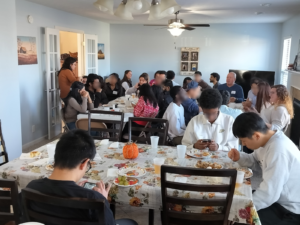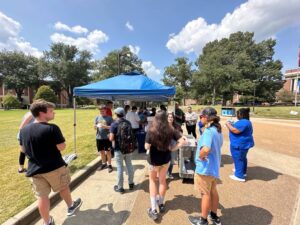The first month of school shapes collegiate ministry for the entire year. Sure, God can and does move in October or April, but typically what does or doesn’t happen the first month of the university year matters in October and in April. Students set their patterns the first three weeks of Fall semester. They often decide quickly where they’ll park, when they’ll eat, who they’ll spend time with, and whether or not they’ll be involved in church or campus ministry. Bam! Decided. Tuesday/Thursday schedule set. Monday/Wednesday/Friday schedule set. Collegiate ministries have a key window of opportunity to enter into a student’s life during the first month of the year. Consider the following tasks for making the most of the first month:
Task One: Pay attention to freshmen. Don’t stalk them, but come close.
- Meet the practical needs freshmen have for friendship, transportation, and so forth.
- Recruit key upperclassmen from your ministry to lead your Freshman Ministry. Who leads your Freshman Ministry determines who participates in it. If you intend to impact a wide variety of freshmen, select a wide variety of upperclassmen leaders.
- Short-term commitments are best for freshmen. Coordinate 4-6 week studies just for them. Yup, you can coordinate another 4-6 week study when that one is finished. Freshmen will more likely sign up for two 4-6 week studies than for one 8-12 week study. A great free freshman study can be found HERE.
- Keep your hand in Freshman Ministry. Sometimes it’s easy to give Freshman Ministry to an intern or associate. While it may be natural for another to take the lead on such a time-consuming ministry, it’s important for the future of your ministry for YOU to be involved in some way on a weekly basis.
- Shadow a freshman each year. Picks a freshman to follow for a day during the first month of school. He attends class, eats in the cafeteria, goes to Walmart, plays video games, and a host of other things with the student. You’d be surprised how much he learns.
Task Two: Emphasize strong weekly programs that develop students spiritually.
- While special events are fun during the first month of school, it’s the consistent on-going programs that make collegiate disciples. Give students the chance to experience your regular things, not just special events during the first month of school.
- Give students an opportunity to respond to the gospel every week. This can be done in lots of creative ways but needs to be done regularly.
- Don’t over program. Keep the students’ full schedule in mind.
- Make sure all weekly programs have relational and experiential elements to them.
Task Three: Study the often-changing culture of your campus.
- Read (or at least scan) the campus newspaper, and lead your ministry to respond to at least one story each week.
- Serve your campus at least once a month.
- Meet and befriend the student affairs personnel. Ask lots of questions.
- Learn and follow the rules of your campus.
Task Four: Assist students in making life decisions.
- Some say the most change in an adult’s life happens between high school graduation and the following Christmas.
- Significant life decisions made by college students include: faith, vocational choice, moral choices, who and when to marry, development of healthy independence in changing relationships with family, time management and priorities, and stewardship of life, gifts, and possessions.
- Develop relationships the first month with mental health professionals on campus and in the community. Know who you will refer students to before the need arises.
- Offer topical Bible studies related to decisions college students face.
*This article was previously published at youngadults.lifeway.com.






